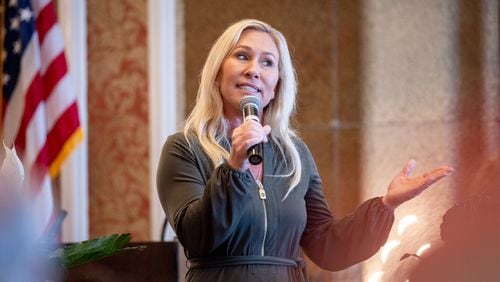As a former senior official with both the U.S. Department of Justice and U.S. Department of Homeland Security, I spent my entire public service career disrupting some of the most-pressing threats to our homeland. Consequently, my perspective of American security is shaded by the specter of terrorism and narcotrafficking, two vast perils which can erode our liberty and weaken our economic security. But nothing in my career has frightened me as much as the ongoing opioid epidemic — it is a national security crisis. And whether we officially declare it a “national emergency” or not, our country’s leaders, law enforcement and communities must come together to resolve this critical threat. Anything short of a comprehensive commitment to radical reform all but ensures that this scourge will continue its devastating sweep across America.
Let’s consider the toll in national security terms. Between 1975 and 2015, an estimated 3,450 Americans died in terrorist attacks; in 2016, drug overdoses killed roughly 64,000 Americans, more than during the entire Vietnam War. The majority of these overdose deaths were linked to opiates. This year, the number of deaths due to drug overdoses may equal the total American deaths in Afghanistan, Iraq and Vietnam. Massachusetts Senator Ed Markey aptly likened the crisis to a new kind of terrorism: “The terrorist threat families in America see is not in the streets of Aleppo. It’s fentanyl coming down your street.” (https://www.statnews.com/2017/04/25/opioid-deaths-map/)
But unlike terrorism, the menace of opioids isn’t part of a plot designed to corrupt our way of life. Even foreign drug trafficking organizations are merely responding to an explosive demand. Drug epidemics and controversies have been a part of American life since the development of morphine and heroin in the 19th century. Opiates and coca derivatives from unscrupulous producers flooded American markets, leading to a rash of overdoses and widespread outcry. More than 100 years ago, Congress responded with the Harrison Narcotics Tax Act, which tightly restricted doctors’ ability to prescribe narcotics. The national conversation about opiates then included elements of moral appeals, racial animus and xenophobic scaremongering — all of which would return in future iterations of our drug wars.
The story of our current crisis began with a rapacious pharmaceutical industry, but drug companies are only the beginning. Nearly 80 percent of individuals who reported using heroin in the past year had previously abused prescription pain pills, and approximately three-quarters of all overdose deaths in 2015 involved the use of heroin and synthetic opiates, as opposed to prescription medications. The evidence suggests pain pills are often just the first step on a long and treacherous road. Cartels and private manufacturers are producing ever-more-potent substances, designed to provide a high so intense users are instantly addicted, if not killed. And these drugs have an unusually receptive potential market, as millions of Americans live in areas experiencing profound economic decline. Opiates offer a fleeting sensation of absolute bliss, a powerful temptation for the emotionally vulnerable and the hopeless. In towns where local industries have disappeared, it’s difficult to compete with the feeling of escape, however brief.
If opioids are a national security problem, then what is the national security solution? A new war on drugs will not succeed any more than a war on loneliness. Complex societal and economic problems are not resolved with a militant response. The “fight” should be reserved for law enforcement and intelligence professionals developing counter-drug strategies. We should continue to combat the importation and production of dangerous drugs, especially highly lethal analogues such as carfentanil. Meanwhile, everyday Americans should view ourselves not as an army but a homefront, providing essential support to those in need. We should adopt the homefront mentality, in which everyone shares responsibility for our national well-being and can contribute in a meaningful way.
We must do more to limit the wide availability of powerful opioids while ensuring they remain accessible to patients with a legitimate need. Recent practices curbing new prescriptions, so called “pill mills” and doctor-shopping are a good start, but still inadequate to stem the tide. We also need nationwide access to effective addiction resources. We should embrace medical innovations, such as life-saving naloxone and naltrexone for managing dependence, in combination with therapy. We should expand the drug court system to include as many nonviolent offenders as possible.
And we must begin the challenging, but vital work of rebuilding hollowed-out communities. Illegal drugs will be a compelling choice so long as people lack opportunities for substantive employment and personal fulfillment. We need a national commitment to rehabilitation, reconstruction and resilience. Even in an era of stark partisan and personal divides, a crisis that kills an average of nearly 150 Americans per day should bring us together. Our leaders throughout government, industry and community must have the courage to acknowledge that one of the gravest threats today is no foreign adversary, but a uniquely American tragedy.





